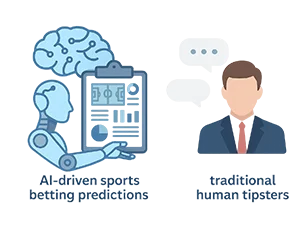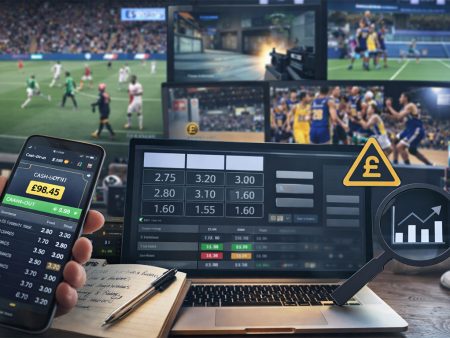Please gamble responsibly. If you or someone you know has a gambling problem, please visit gambleaware.com, gamcare.org.uk or gamstop.co.uk to find help.
Artificial intelligence is transforming how punters approach sports betting by replacing outdated strategies with precision-based models. With the rise of ai-powered betting predictions, machine learning systems now process vast data sets to uncover trends that escape human detection. This evolution offers players smarter, more consistent insights into outcomes and value.
From analysing player performance to factoring in real-time variables, intelligent systems offer a practical edge. Bettors increasingly rely on these predictive technologies to enhance accuracy and stay ahead of market shifts. As the industry adapts, understanding how AI reshapes decision-making is essential for staying competitive and informed. Before acting, examine confidence bands, error calibration, and sample drift; sports betting tips ai predictions gain practical utility when you’ll log assumptions, tag market context, and re-test selections after odds move.
Evolution of AI in Sports Gambling
The landscape of sports gambling has undergone a dramatic transformation, driven largely by technological progress. In earlier decades, bookmakers set odds manually, relying heavily on experience, gut feeling, and recent form. As demand for precision and scalability grew, predictive analytics entered the scene, laying the groundwork for what would eventually become ai sports betting predictions. Early systems introduced algorithmic methods to refine odds creation, but lacked the dynamic learning capacity seen in today’s models. Machine learning changed that. Rather than following static procedures, these systems adapt with each new data point. The industry now thrives on algorithmic sports predictions powered by artificial intelligence, where real-time player data, environmental factors, and historical match statistics feed into ever-evolving frameworks. The road to intelligent, data-led wagering is paved with innovation. Major breakthroughs, particularly in computational power and model sophistication, have made ai betting predictions more accurate and widely accessible. The journey reflects a broader shift in betting behaviour, where insight trumps instinct, and precision replaces presumption.
- 1990s: Introduction of basic spreadsheets and manual stat tracking for bet analysis.
- 2003: Emergence of web-based sports data platforms allowing broader access to statistics.
- 2010: Rise of algorithmic models using regression analysis for odds calibration.
- 2017: Integration of machine learning for outcome forecasting using historical and live data feeds.
- 2023: Widespread use of adaptive AI systems offering near real-time predictive analytics sports wagering tools.
Modern systems now dominate the landscape, offering smarter ways to assess probability, detect mispriced markets, and craft more efficient betting strategies across various sporting disciplines.
From Rule-Based Systems to Deep-Learning Sports Prediction
In the initial phase of AI integration into betting, most systems were grounded in strict, rule-based logic. These followed predefined parameters and conditional statements, offering a form of automation but with limited adaptability. As the betting environment grew more complex, their shortcomings became clear. They couldn’t adjust for unexpected results, shifting player dynamics, or new patterns emerging in data. Modern ai predictions betting tools leverage advanced neural networks instead. These models don’t depend on fixed instructions. Instead, they learn from vast datasets, identifying correlations and outcomes previously hidden from human observation. The evolution into deep learning marks a pivotal leap — transforming basic calculations into intelligent forecasts that evolve over time. Neural network betting tips rely on thousands of inputs, including team momentum, playing styles, and subtle performance shifts. With each match analysed, these systems refine their assumptions, boosting accuracy and relevance. This shift from programmed logic to deep learning has created forecasting models that can react to changes in real-time, offering bettors a stronger decision-making foundation than ever before.
| Rule-Based Systems | Deep Learning Models |
|---|---|
| Fixed logic with limited flexibility | Adaptive learning from ongoing data |
| Predetermined outcomes from conditions | Pattern recognition without explicit programming |
| Struggles with unexpected variables | Handles uncertainty with probabilistic modelling |
| Suitable for static data analysis | Excels in dynamic, real-time environments |
Core Machine-Learning Concepts
To benefit from ai sport betting predictions, it’s essential to understand the building blocks that make them function. At the heart of every sports-focused AI tool lies a sequence of processes designed to extract insight from complex data. These steps enable machines to anticipate potential outcomes and guide betting decisions with increasing accuracy. The first principle is data sourcing. Machine learning tools rely on structured historical inputs — team stats, weather, form, player metrics — to inform every projection. Once raw information is gathered, feature selection follows. This step isolates the most influential variables, such as home-field advantage or injury records, that significantly impact match results. Next, models are trained on this refined information. Training involves showing the machine patterns from past events, allowing it to generalise and apply similar logic to future scenarios. The objective is to avoid memorisation and instead reach informed assumptions. A key risk in this process is overfitting, where the system becomes too tailored to historical cases, reducing its effectiveness when applied to unseen events. Understanding these core principles is critical for bettors aiming to make sense of sports betting ai predictions. While outputs may seem abstract at first, they represent mathematical interpretations of real-world patterns and can vastly enhance the way bets are placed, monitored, and adjusted.
- Data Sourcing: Gathering structured historical inputs relevant to match outcomes.
- Feature Selection: Identifying impactful data points to build meaningful input sets.
- Model Training: Teaching the algorithm by feeding it numerous past scenarios.
- Overfitting Awareness: Ensuring models remain flexible for new, unseen events.
- Prediction Output: Calculating probabilities based on patterns recognised in the data.
- Result Interpretation: Decoding model forecasts to support betting judgement.
These key components underpin every intelligent prediction system and form the bridge between raw information and practical, predictive modeling for bettors.
Data Collection, Feature Engineering and Model Training Explained
The journey from raw sports data to reliable betting forecasts begins with the collection of high-quality inputs. AI tools for betting require consistent, structured records — player form, match conditions, possession statistics — scraped from official sources or third-party providers. Inconsistent figures can lead to flawed results, so automated scripts are often used to gather and verify large volumes. After gathering data, the next phase is feature engineering. This involves transforming raw inputs into structured indicators. For instance, average goals per game may be split into home versus away matches or weighted differently depending on opponent strength. This stage allows the algorithm to detect patterns, particularly when making ai betting predictions free from noise or redundancy. Once features are shaped, model training begins. During this stage, systems process thousands of labelled examples, like wins or losses, to understand patterns in data distribution. The challenge is balance — if the machine memorises outcomes too closely, it’s said to overfit, making it less useful for real-life scenarios. Analysts employ methods such as cross-validation and dropout regularisation to counteract this risk. AI football betting predictions depend on iterative testing. Each cycle assesses prediction errors, tweaks internal weightings, and improves accuracy. Over time, repeated exposure sharpens the model’s instincts, enabling stronger and more adaptive betting intelligence.
| Stage | Description | Purpose |
|---|---|---|
| Data Collection | Retrieve structured inputs from verified sports feeds | Provide foundational material for model development |
| Feature Engineering | Refine raw inputs into measurable, predictive factors | Enhance pattern detection capabilities |
| Model Training | Feed cleaned, labelled data into the learning system | Enable accurate response to new scenarios |
| Error Handling | Apply validation tools to reduce overfitting risk | Maintain consistent performance under varying conditions |
Choosing AI Betting Tools

Finding platforms that offer the best ai betting predictions requires scrutiny. As the market becomes saturated with promises of guaranteed returns, it’s vital to distinguish credible software from marketing hype. Sound decision-making starts with understanding what features genuinely support automated wagering decision support, not just flashy dashboards. First, consider user experience. A clean, intuitive interface lets you focus on insights rather than navigation. Transparency is another must. Top-tier providers clearly outline how their algorithms work, what data they analyse, and which models they use. Avoid systems that offer no insight into their methodology. Predictive strength should never be assumed. Evaluate past performance and ask whether the platform updates its logic regularly. Adaptive learning in betting predictions helps the system stay relevant as player form, league structures, and betting markets evolve. Additionally, review supported sports — many platforms are football-heavy, while others offer broader selections across tennis, basketball, or racing. Pricing also plays a key role. While some solutions charge monthly, others offer ai betting predictions free as part of community-driven platforms. Choose an option that aligns with your budget without sacrificing model quality or result frequency.
- User Interface: Tools should be simple to navigate with a clean visual layout.
- Transparency: Clear model explanations build trust and enable better application.
- Predictive Quality: Measured by recent accuracy and historical success rate.
- Sports Coverage: Platforms differ significantly in supported disciplines.
- Model Adaptability: Frequent updates indicate stronger learning cycles.
- Subscription Pricing: Match costs with features to assess overall value.
Selecting well-equipped AI tools can provide real advantage — especially when the service balances intelligent design with up-to-date learning capacity and clarity of use.
Comparison of Capabilities of AI Betting Tools
Several platforms offering the best ai sports betting predictions have gained popularity through their ability to deliver consistent insights. The quality of their outputs depends not only on historical data but also on the models and processes used to refine forecasts. These systems deploy statistical sports betting models to assess odds and detect mispriced markets. The comparison below outlines essential features of leading solutions currently available in February 2026. Each supports different sports and operates under distinct structures, whether free or subscription-based. Choosing between them depends on individual betting style, preferred sports, and the value placed on AI-enhanced wagering recommendations.
| Platform | Supported Sports | Key Features & Pricing |
|---|---|---|
| BetAnalytica | Football, Tennis, Cricket | Neural forecasts, streak tracking, £15/month |
| EdgeAI Sports | Football, Basketball, eSports | Adaptive learning engine, live alerts, £25/month |
| ValueOddsBot | Football, Horse Racing | Free ai betting predictions, public model sharing |
| SmartWager Pro | Football, Baseball, Rugby | Probabilistic graphs, bet confidence index, £9.99/month |
| QuantBetX | Football, NFL, MMA | Multivariate forecasting, pricing transparency, £30/month |
| Predictron Sports | Football, NBA, NHL | Pattern-based scoring, AI-enhanced tips, £12/month |
| InsightBet AI | Football, Golf, Snooker | Real-time model tuning, data heatmaps, £19.95/month |
Each service caters to unique preferences — some offering advanced statistical depth, while others favour community-driven simplicity and accessible insights.
Using Specialist Odds Analysis Platforms
Sophisticated bettors often use specialist tools to interpret real-time changes in odds markets. These AI-enhanced systems go beyond basic value identification. Instead, they employ sports betting predictions ai algorithms to track subtle shifts that traditional analysts may miss. When used properly, such platforms help punters adjust their strategy just before market realignment occurs. Sharp users rely on real-time odds prediction technologies to detect anomalies across bookmakers. These platforms map sudden pricing trends, often triggered by team news, injury updates, or unexpected staking volumes. Some even integrate sentiment analysis from social platforms to anticipate odds pressure from public perception shifts. Unlike conventional tools, these analysis systems focus on timing, not just accuracy. The best systems extract competitive edge through latency-aware updates. Bettors who respond before odds correct can exploit favourable gaps in pricing.
- Live Trend Detection: Track bookmaker price movements as they occur.
- Market Pressure Monitoring: Identify volume-driven changes in pricing dynamics.
- Sentiment Analysis: Gauge influence of media or public buzz on betting lines.
- Arbitrage Flagging: Spot gaps where profit is guaranteed across sportsbooks.
- Pre-Match & In-Play Alerts: Receive timely nudges when odds swing significantly.
Tools focused on sports betting trend analysis allow users to make better-informed decisions, react quickly to volatile conditions, and reduce reliance on guesswork in high-pressure wagering environments.
Crafting Strategies Using AI Betting Predictions

Blending human insight with betting tips ai predictions today creates a balanced, tactical advantage. Machine learning excels at pattern recognition, while experienced bettors bring context and intuition. When both forces align, they form data-driven betting strategies capable of responding to pre-match metrics and live developments with precision. Bettors can use AI-generated forecasts to screen events, filtering out mismatches or volatile markets. Instead of manually reviewing every fixture, systems identify promising opportunities based on historical similarities and real-time updates. Once a match is selected, personal logic can refine selections — factoring in local knowledge, injury rumours, or tactical shifts unaccounted for by machines. Probabilistic betting frameworks produced by AI present percentages rather than guarantees. Rather than viewing them as fixed predictions, bettors should treat these probabilities as tactical indicators — guiding choices without eliminating judgment. When live odds diverge from AI benchmarks, that difference can flag potential value or signal risk. Integrated strategy thrives on synergy. Rather than depending solely on algorithms, combining machine suggestions with independent judgment allows users to evaluate, adjust, and execute smarter plays.
- Start with AI Filters: Use models to shortlist relevant matches or markets.
- Overlay Personal Insights: Factor in local knowledge or situational dynamics.
- Compare Live Odds to AI Forecasts: Identify mispriced markets in real time.
- Adjust Stake Size: Scale investments based on AI-driven probability assessments.
- Review Outcome Patterns: Use feedback loops to refine future betting routines.
Combining structured machine insights with tactical flexibility enables more robust betting predictions ai users can trust under variable sporting conditions.
Prompt Engineering for Betting
Effective use of GPT-based platforms hinges on crafting relevant prompts. While many bettors focus solely on results, intelligent prompting ensures more accurate betting tips ai predictions today. Context, phrasing, and detail significantly influence AI-generated outputs, especially when seeking tailored match insights or niche market edges. Providing the model with structured inputs — team names, recent form, venue, odds ranges — results in richer, more specific suggestions. Poorly designed prompts yield vague forecasts, while refined questions elicit stronger, more practical outcomes. Framing prompts around betting goals also helps, distinguishing between value-seeking or conservative recommendations. Bettors exploring daily betting predictions should think like analysts. Requesting structured, data-supported reasoning instead of simplistic win/loss answers increases long-term value. AI-enhanced wagering recommendations flourish when users actively guide their flow.
Experts opinions:
It’s not just what data the AI uses, it’s how we ask for the outcome.
Dr. Jan Koller, Data Science Lead at TipsterTechher
Precision in prompts equals precision in predictions. Vague requests mislead even the smartest systems.
Elisa Martín, Sports AI Strategist at SmartOdds (smartodds.co.uk)
Daily betting prompts should focus on probability bands and scenarios, not fixed outcomes.
Luke Sheridan, Machine Learning Engineer at PredictWise
When using AI tools, prompt engineering becomes a crucial skill — impacting not just accuracy, but also the strategic range of available suggestions.
Bankroll Management and Risk Control Using AI
Applying machine learning to bankroll strategy provides bettors with risk control tools that go beyond static formulas. By tracking historical patterns and simulating various outcomes, intelligent platforms help mitigate overexposure and reduce variance. This supports more disciplined wagering and long-term sustainability. Answering the question “how does ai improve the accuracy of sports betting predictions” requires looking beyond wins. AI systems offer risk profiles on each potential wager, often highlighting low-probability yet high-liability bets. These alerts allow users to steer away from emotionally driven punts and apply logic-led limits. Advanced tools model risk through simulations — testing what would happen if bets consistently failed, won partially, or hit rare outliers. These probabilistic betting frameworks foster smarter planning and encourage diversified staking across multiple matches or outcomes. AI also adjusts models as performance data accumulates, making systems more reliable with use. AI predictions betting tools often include dashboards showing current exposure, projected variance, and suggested stake resizing based on live bankroll metrics. This real-time guidance supports continuous discipline, even under pressure.
| Metric | Explanation | Benefit |
|---|---|---|
| Exposure Heatmaps | Shows where bankroll is concentrated | Promotes diversification and balance |
| Win Probability Ranges | Assigns odds-based likelihood brackets | Helps optimise stake size logically |
| Loss Simulation Models | Forecasts risk scenarios based on variables | Supports defensive bankroll strategy planning |
By combining insight with structure, AI risk management in betting provides crucial guidance to protect funds and maximise long-term value across varied wagering environments.
Measuring Accuracy of AI Predictions vs Human Tipsters

Comparing ai betting predictions to traditional human tipsters reveals distinct advantages and limitations on both sides. Artificial intelligence models excel in processing vast datasets, detecting statistical anomalies, and updating forecasts as variables shift. By contrast, human analysts offer intuition, emotional context, and instinctual insight into unpredictable elements, such as managerial decisions or locker-room tensions. AI systems deliver forecasts with consistent structure. They evaluate form, venue, head-to-head history, and tactical setups using probabilistic frameworks. As a result, predictions based on ai sports betting predictions free from bias or fatigue can maintain high levels of consistency over time. Yet, they may miss rare context-specific signals like tactical substitutions or mental resilience — elements that seasoned analysts sometimes spot. While human tipsters shine in edge cases and narrative-driven environments, their performance varies due to mood, overconfidence, or recency bias. AI, though more reliable in pattern-based contexts, may struggle with black swan events or data-sparse scenarios. Ultimately, predictive modeling for bettors works best when both methods are integrated — combining historical depth with situational awareness to build comprehensive sports event outcome forecasting strategies.
- Data Volume: AI evaluates thousands of matches simultaneously; humans focus on fewer fixtures.
- Emotional Bias: Machines stay objective; human tips may reflect loyalty or sentiment.
- Adaptability: Models retrain continuously; tipsters adapt through experience.
- Consistency: AI delivers stable outputs; analysts may vary week to week.
As bettors increasingly rely on technology, understanding each system’s performance edge becomes vital for selecting trustworthy prediction sources and building balanced approaches.
Football Case Study
The effectiveness of ai football betting predictions can be measured across diverse football environments. International tournaments, such as the World Cup and UEFA Euro, pose unique challenges due to infrequent matches and less consistent player data. Conversely, club competitions like the Premier League and Champions League offer richer datasets, enabling more refined statistical sports betting models. In national competitions, AI must adjust for rotating squads, manager changes, and unfamiliar team matchups. Here, AI-driven match outcome predictions depend heavily on recent form, player club data, and tactical metrics adapted from fewer samples. This makes forecasting outcomes at the international level more volatile compared to domestic leagues. At club level, where matches occur weekly and statistics accumulate rapidly, predictive accuracy improves. Models identify trends, formations, and injury impacts more precisely. Over time, deep training data enhances performance, especially when deployed across full seasons or long tournaments. Paid betting predictions often reflect this distinction, with premium models tailored to club analytics due to their data consistency. The table below illustrates how machine learning models perform across five major football settings based on real-world case studies evaluated through retrospective accuracy audits.
| Competition Type | Average Prediction Accuracy | Key Modelling Challenge |
|---|---|---|
| UEFA Euro | 65% | Short tournament cycles, unfamiliar teams |
| FIFA World Cup | 67% | Low match frequency, rotated squads |
| Premier League | 74% | Injury volatility, fixture congestion |
| Champions League | 71% | Cross-league comparisons, tactical diversity |
| Domestic Cups | 63% | Line-up uncertainty, second-string squads |
Despite stronger results in club formats, the combination of algorithmic insights and human expertise remains the optimal approach for interpreting football outcomes effectively.
Responsible & Ethical AI-Driven Gambling
As sports betting ai predictions become more sophisticated, maintaining responsible usage is crucial. The convenience and accuracy of machine learning can tempt users into compulsive play or over-reliance. These tools must complement judgment, not replace it. Transparency in how predictions are generated also matters — users should understand what data powers the models they trust. Gamblers should adopt AI with mindfulness, recognising its strengths while guarding against potential pitfalls. Safe use means understanding that even the most accurate predictions carry uncertainty and that financial decisions remain personal responsibilities. Ethical play supports gambling harm reduction strategies by balancing tech with self-awareness.
- Know the Limits: AI models don’t guarantee success — treat outcomes as probabilities, not promises.
- Stay Transparent: Choose tools that clearly explain how their predictions are formed.
- Avoid Overuse: Set clear time and usage boundaries for AI support.
- Use for Guidance: Let predictions inform decisions, not dictate them.
- Check for Bias: Ensure the model accounts for varied inputs and isn’t overly skewed.
Setting Limits and Guardrails for Safe Betting
When using betting tips ai predictions today, integrating safety mechanisms is essential. AI tools can assist not just in forecasting outcomes but in helping bettors stay within safe behavioural bounds. Ethical platforms often incorporate smart sports betting algorithms with responsible use features. Automated wagering decision support tools now come equipped with options that detect risk indicators like stake escalation or extended play. These AI features act as prompts for reflection and prevention, not punishment. Some systems also restrict access after a threshold is breached, providing a digital safeguard against impulsive behaviour.
- Session Time Alerts: Notifies users after prolonged betting periods.
- Wager Caps: Allows players to set financial limits before betting begins.
- Loss Limits: Locks further wagers once a loss threshold is reached.
- Behavioural Nudges: Alerts when betting habits deviate from the norm.
- Self-Exclusion Integration: Syncs with broader responsible gambling frameworks.
Embracing free ai betting predictions within a structured, ethical framework helps promote sustainable play while still enjoying the analytical advantages of modern tools.
Use AI for Sports Betting
AI-powered betting predictions offer an innovative path for bettors seeking data-supported strategies. These systems can uncover hidden trends, process massive datasets, and deliver unbiased analysis. Yet, while the benefits are compelling, they are not without limitations. Machine learning models work best when users approach them as tools — not absolute solutions. AI predictions betting systems perform strongest under consistent data conditions. Those new to sports wagering or seeking structured support may benefit most. More experienced punters can also extract value by integrating AI suggestions with their established analysis. However, caution is essential — overdependence may lead to mechanical thinking and neglected judgment. Experts stress the importance of moderation and mindful integration. Betting remains a form of entertainment where risk always exists, regardless of technological sophistication.
Experts opinions:
AI tools amplify what informed bettors already do. They don’t eliminate risk, but they reduce guesswork.
Oliver Barnes, Betting Data Analyst at Trademate Sports (tradematesports.com)
Those relying entirely on AI may overlook shifting dynamics that aren’t statistically predictable.
Marina Doyle, Lead Researcher at Pinnacle EdgeLab (pinnacle.com)
Balance is key. Let AI inform your process — not control it.
Peter Zhang, Machine Learning Architect at Tipstrr AI (tipstrr.com)

Try Available Non GamStop Bookmakers
Click the bookmaker name or logo to open the linked review. The review explains the site and shows what to verify.
More information related
- Wikipedia about Sports Betting Systems and Strategies
- Reddit Thread on What is the best AI alogritmic software for betting on soccer matches
- Responsible Gambling Tools of Gambleaware
Can AI predict sports betting?
AI can estimate probabilities using historical data, live metrics, and pattern recognition. These sports betting ai predictions help you spot value and avoid emotional decisions. They’re sophisticated calculators, not fortune-tellers, so you should still treat every wager as risky and manage stakes cautiously.
Can ChatGPT predict bets?
ChatGPT can explain concepts, outline frameworks, and help you think through betting tips ai predictions today, but it doesn’t see live odds or hidden team information. Treat its output as educational guidance, not a signal to stake money or chase particular markets.
How good is AI at predicting?
Performance varies by sport, league depth, and model quality. In data-rich environments, ai sport betting predictions can outperform casual tipsters by staying objective and updating quickly. Even the best ai betting predictions still hit losing streaks, so you must protect your bankroll.
Can AI give football predictions?
Yes. Many platforms specialise in ai football betting predictions using xG, pressing intensity, rest days, and tactical data. They provide percentages, not certainties, so the smartest use combines these numbers with your own reading of line-ups, motivation, and schedule congestion.
What is the 30% rule in AI?
In betting circles, people sometimes use a “30% rule” as a rough reminder that even strong edges lose frequently. It’s a mindset tool, not a hard scientific law, and fits with probabilistic thinking behind betting predictions ai approaches and disciplined bankroll management.
Which is the best AI for prediction?
There isn’t a single winner. The best ai sports betting predictions for you depend on preferred leagues, budget, and how much you understand the underlying models. Look for transparency, long-term records, and tools that fit your style rather than chasing hype.
How can betting tips ai predictions today support a long-term plan?
Use today’s model outputs to filter fixtures, not to chase every highlighted edge. Over months, sports betting predictions ai tools help you record results, refine staking rules, and spot patterns in your own behaviour, turning scattered punts into a structured process.
Are free ai betting predictions reliable enough for casual bettors?
Free ai betting predictions and other ai betting predictions free dashboards can be handy for learning. Expect simple models, limited sports, and patchy maintenance. For light, low-stakes play they’re fine, as long as you treat them as suggestions rather than guarantees.
How does AI improve the accuracy of sports betting predictions in practice?
How does ai improve the accuracy of sports betting predictions? By processing injury news, schedule density, style metrics, and price moves faster than humans. These systems cut through noise, highlight misalignment between odds and data, and keep your assumptions grounded in evidence.
Should I trust daily betting predictions from AI more than my own judgement?
Daily betting predictions generated by ai-powered betting predictions work best as a second opinion. Let the machine flag opportunities, then apply your knowledge of context, tactics, and risk tolerance. When model output and personal view disagree, reduce stakes or skip the event.








This write-up nails why model-led picks can help. Yet price movement, late team sheets, plus market juice still bite. Use numbers as a nudge, watch line-ups, trust gut; who wants to back robot logic when dodgy hamstring ruins everything.
AI picks feel handy, yet juice plus late line-ups sting